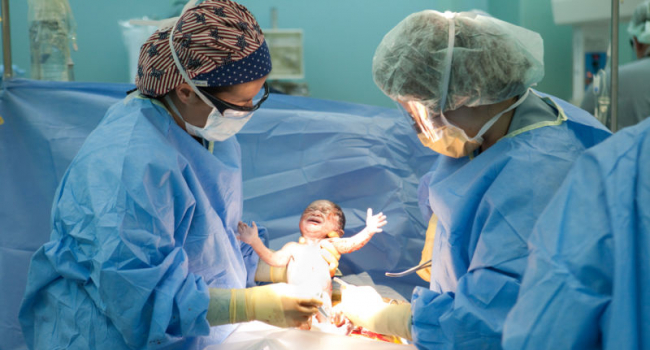- Latest news▼
-
11:08, April 25 Mpox epidemic declared in Republic of the Congo

-
08:31, April 25 OU: quitting smoking 4 times more likely to cure laryngeal cancer

-
01:20, April 25 Paralyzed man in China writes hieroglyphs using neural implants placed in his brain

-
15:11, April 24 Zombie deer disease possibly linked to hunters’ deaths

-
12:27, April 23 Appetite: Scientists found out the secret to the appeal of large portions of fast food

-
10:33, April 23 Scientists test new approach to fighting viruses

-
08:38, April 23 Ketamine may help with postpartum depression

-
22:12, April 22 Unhealthy amount of sugar found in baby food products of a well-known brand

-
19:41, April 22 Air pollution puts health of more than 1.6 billion workers globally at risk

-
17:25, April 22 Scientists found baked goods and lack of sleep to be more dangerous than alcohol

-
16:02, April 22 342 cases of measles recorded in Armenia so far in 2024

-
15:29, April 22 BrainStimulation: electrical brain stimulation alleviates anxiety and depression in the elderly

-
08:27, April 22 Cognitively stimulating jobs in midlife could lower dementia risk in old age, study finds

-
20:37, April 21 Environmental Health Perspectives: Microplastics ingested with food and water can spread from the gut to the brain

-
22:41, April 20 Scientists develop new method to safely stimulate immune cells to fight cancer

All materials
To catch a drug thief, hospital secretly recorded births, women’s surgeries

A California hospital faces a lawsuit from 81 women who allege they were secretly filmed by hidden cameras in labor and delivery operating rooms while undergoing extremely intimate procedures, including Caesarean births, sterilizations, and operations to resolve miscarriages.
The women claim that their privacy was egregiously violated by the hospital, Sharp Grossmont Hospital in La Mesa, California, which is run by Sharp HealthCare. The women say they did not consent to be filmed during the procedures—and would not have done so if given the choice.
Moreover, they allege that their sensitive videos were insecurely stored on various desktop computers, some of which were not even password protected, and that numerous non-medical staff members—including security guards and attorneys—were able to watch the videos. The lawsuit further alleges that the hospital made no effort to log or monitor who viewed the footage and did not ensure proper deletion of the data. In all, the lawsuit estimates that the hospital had secret recordings of around 1,800 procedures that took place in the women’s center.
In its response, Sharp readily admits to installing hidden, motion-activated cameras in its three labor and delivery operating rooms for the purpose of surreptitious filming. But, it says, it didn’t intend to film patients; rather, it was trying to catch a thief. In a statement, Sharp notes that between July 2012 and June 2013, it used the secret filming to try to catch the person or people who had been stealing powerful drugs from the anesthesia carts in the rooms.
“Although the cameras were intended to record only individuals in front of the anesthesia carts removing drugs, others, including patients and medical personnel in the operating rooms, were at times visible to the cameras and recorded,” Sharp acknowledged.
Those recordings caught “women while they were emotionally and physically exposed, and at their most vulnerable,” according to the lawsuit.
The lawsuit also points out that Sharp’s Patients’ Rights states that patients have the right to “Confidential treatment of all communications and records pertaining to your care and stay in the hospital” and that “written permission shall be obtained before medical records are made available to anyone not directly concerned with your care.”
Sharp added, “We sincerely regret that our efforts to ensure medication security may have caused any distress to those we serve.” It declined to comment further, citing the active litigation.
Source: arstechnica.com
Follow NEWS.am Medicine on Facebook and Twitter
- Video
- Event calendar
- Archive
- Most read
month
week
day
- JAMA Oncology: Urine test can help rule out high-grade prostate cancer with almost 100% accuracy, study shows 1266
- Daily Mail: Elderly woman in China gets infected with brain-eating amoeba 1207
- Scientists grow human mini-lungs in lab 1153
- Next pandemic likely to be triggered by flu - scientists 912
- Scientists found baked goods and lack of sleep to be more dangerous than alcohol 822
- 342 cases of measles recorded in Armenia so far in 2024 779
- Scientists develop new method to safely stimulate immune cells to fight cancer 761
- Blood test can determine who is at risk of developing multiple sclerosis - scientists 758
- Cognitively stimulating jobs in midlife could lower dementia risk in old age, study finds 745
- BrainStimulation: electrical brain stimulation alleviates anxiety and depression in the elderly 688
- Unhealthy amount of sugar found in baby food products of a well-known brand 561
- Air pollution puts health of more than 1.6 billion workers globally at risk 556
- Ketamine may help with postpartum depression 543
- Appetite: Scientists found out the secret to the appeal of large portions of fast food 543
- Scientists test new approach to fighting viruses 522
- Find us on Facebook
- Poll





